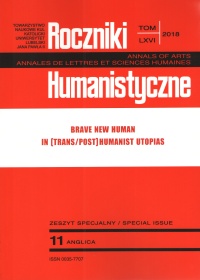Transhumanist Dreams and/as Posthuman Nightmares in Black Mirror
Abstract
This paper analyses a TV series Black Mirror in relation to transhumanism, a philosophical movement that endorses (bio)technological augmentation as a means whereby mankind will transcend its current biological limitations and reach a new, posthuman stage in its evolution. Taking tendencies observable in contemporary Western societies as the starting point for its depiction of the near future, Black Mirror gives fictional representation to such transhumanist concepts as disembodied, transferable consciousness and enhanced cognition, and suggests that more often than not they may give rise to posthuman dystopia rather than utopia, envisioned by transhumanism.
References
Bostrom, Nick. “Letter from Utopia.” Nick Bostrom’s Home Page. 2010. Web.
Bostrom, Nick. “Why I Want to Be a Posthuman When I Grow Up.” The Transhumanist Reader: Classical and Contemporary Essays on the Science, Technology, and Philosophy of the Human Future. More and Vita-More, eds. 28–53. Print.
Claeys, Gregory. Dystopia: A Natural History. A Study of Modern Despotism, Its Antecedents, and Its Literary Diffractions. Oxford: Oxford University Press, 2017. Print.
Clark, Andy. Natural-Born Cyborgs: Minds, Technologies, and the Future of Human Intelligence. Oxford: Oxford University Press, 2003. Print.
Elsaesser, Thomas. “The Mind-Game Film.” Puzzle Films: Complex Storytelling in Contemporary Cinema. Ed. Warren Buckland. Chichester: Wiley-Blackwell, 2009. 13–41. Print.
Hauskeller, Michael, Thomas D. Philbeck, and Curtis D. Carbonell, eds. Palgrave Handbook of Posthumanism in Film and Television. Houndmills: Palgrave Macmillan, 2015. Print.
Hauskeller, Michael, Thomas D. Philbeck, and Curtis D. Carbonell. “Posthumanism in Film and Television.” Hauskeller, Philbeck, and Carbonell, eds. 1–7. Print.
Hayles, N. Katherine. How We Became Posthuman: Virtual Bodies in Cybernetics, Literature, and Informatics. Chicago and London: University of Chicago Press, 1999. Print.
Krueger, Joel. “At Home In and Beyond Our Skin: Posthuman Embodiment in Film and Television.” Hauskeller, Philbeck, and Carbonell, eds. 172–181. Print.
“Men Against Fire.” Writ. Charlie Brooker. Dir. Jakob Verbruggen. Perf. Malachi Kirby, Madeline Brewer. Black Mirror. Netflix. 2016. Web.
More, Max. “The Philosophy of Transhumanism.” More and Vita-More, eds. 3–17. Print.
More, Max and Natasha Vita-More, eds. The Transhumanist Reader: Classical and Contemporary Essays on the Science, Technology, and Philosophy of the Human Future. Malden: Wiley-Blackwell, 2013. Print.
“San Junipero.” Writ. Charlie Brooker. Dir. Owen Harris. Perf. Gugu Mbatha-Raw, Mackenzie Davis. Black Mirror. Netflix. 2016.
“Transhumanist Declaration.” World Transhumanist Association. 1998. Web.
Various. “Transhumanist Declaration (2012).” More and Vita-More, eds. 54–55. Print.
Copyright (c) 2018 Roczniki Humanistyczne

This work is licensed under a Creative Commons Attribution-NonCommercial-NoDerivatives 4.0 International License.





